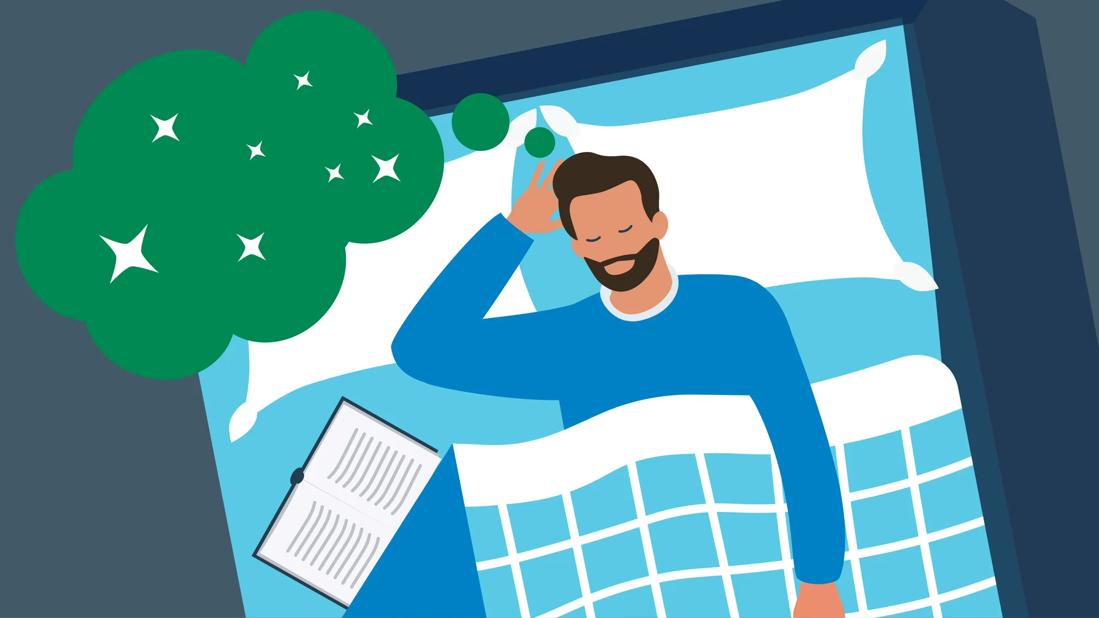If you’re putting off going to bed to have some time for yourself, you’re not doing your well-being any favors

Your day is full of obligations. So, when you finally have that tiny window of time for yourself, what do you do? Maybe some scrolling, posting, reading or binge-watching to forget the troubles of the day? No harm there.
Advertisement
Cleveland Clinic is a non-profit academic medical center. Advertising on our site helps support our mission. We do not endorse non-Cleveland Clinic products or services. Policy
Or so you think.
But if you’re doing all that while you should be sleeping, it’s a problem. That’s called revenge bedtime procrastination. And breaking the habit can make a big difference for your health and happiness.
Revenge bedtime procrastination is when you attempt to take control of your life by using the time before bed to do what you want to do — at the expense of a good night’s rest.
In other words, you know that you should be sleeping. You know that’s the right thing to do for your health and happiness. But instead, you actively stall on putting your head to pillow.
Think of it as a mix of procrastination and stress relief, says sleep medicine psychologist Alicia Roth, PhD. “It’s like you’re taking revenge on your inability to control your life by using that time before bed — what should be your wind-down time — to doomscroll or do other activities that aren’t necessarily healthy for sleep.”
In the moment, reclaiming your me-time at bedtime can feel more like self-care than revenge or procrastination. Especially because we tend to engage in revenge bedtime procrastination in part to squeeze in some little wins after a tough or draining day.
Think about it: You’ve had a big day of meetings, shuttling kids to various activities, taking care of the house and doing everything that everyone else needs, wants and expects from you. There’s no time for you to read your book, check your social feed or watch that show. And you deserve to do a little something just for you, right?
Advertisement
There’s no fault in the logic.
But it’s the timing that could cross the threshold from healthy self-care to less-than-healthy sleep procrastination. If doing those just-for-me things means pushing back bedtime later than is healthy, you’re not doing your well-being any favors.
“It’s like you refuse to do something that you know is good for you, like getting a full night’s sleep, because you’re trying to indulge yourself to make up for how hard the rest of the day has been,” Dr. Roth explains. “With revenge bedtime procrastination, we’re trying to regain that freedom or regain some personal time by sacrificing our sleep.”
You might do it because you feel:
But sleeping less isn’t the answer. Most adults need seven to nine hours of sleep each night. Getting enough shut-eye is critical to keeping your body healthy, your emotions regulated and your mind sharp.
So, when that small window of pre-sleep me-time turns into a doorway to hours of mindless entertainment, it can wreck your sleep. Get in the habit of doing it night after night, and you’ll soon end up zombie-walking through your days — moody, droopy-eyed and in dire need of your morning coffee or energy drink.
Getting enough sleep and having time to relax can sound a little like having your cake and eating it, too. But it doesn’t have to be an impossible task.
Dr. Roth shares these tips to fix revenge bedtime procrastination.
Start by taking a look at some healthy sleep hygiene practices to set the mood for sleep:
Advertisement
The trouble is that revenge bedtime procrastination isn’t always a matter of building better sleep habits. It could be a sign that your current routine isn’t meeting your needs. And that might mean it’s time to take a new perspective on your days.
“Part of getting out of a bad sleep cycle could be reevaluating what you care about in life and figuring out if you’re spending time on things that are important to you,” Dr. Roth clarifies. “Seeking professional support can help you redesign your day to give you time for the things you want to do in addition to the stuff that you have to do. That can be major, overarching therapy work, and it can look different for everyone.”
If revenge sleep procrastination sounds like you, Dr. Roth suggests trying to change your approach for a few weeks.
“If it’s not getting better, reach out to a primary care provider,” she recommends. “You might benefit from sleep interventions or a therapist to work through your stress.”
Advertisement

Sign up for our Health Essentials emails for expert guidance on nutrition, fitness, sleep, skin care and more.
Learn more about our editorial process.
Advertisement

To avoid sleep deprivation and shift work sleep disorder, try adopting habits that minimize light exposure and prioritize daytime sleep

Sleep disorders, mental health conditions and other health concerns can all affect the quality of your sleep

Most people fall asleep within 10 to 20 minutes, but if your experience is different, adjusting your sleep schedule may help

Stick to a consistent schedule, be mindful of screen time and work on reducing your stress levels before bed

Napping can boost focus, memory and mood — if you time it right
These devices can help shed light on what’s happening with your body during rest

Keep a dream journal, set your intentions before bed and make sure you’re getting a full night of high-quality sleep

Controlling your dreams may help you tap into your creativity and even reduce anxiety

Even small moments of time outdoors can help reduce stress, boost mood and restore a sense of calm

A correct prescription helps your eyes see clearly — but as natural changes occur, you may need stronger or different eyeglasses

Both are medical emergencies, but they are very distinct events with different causes